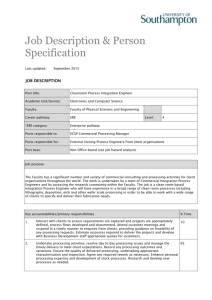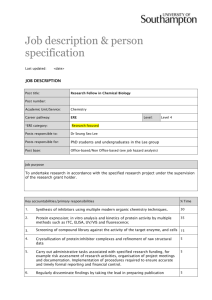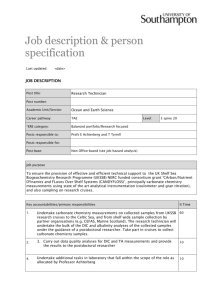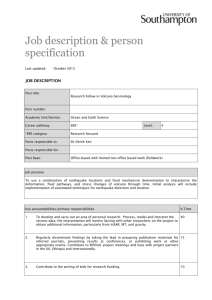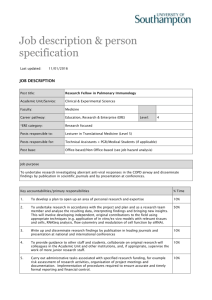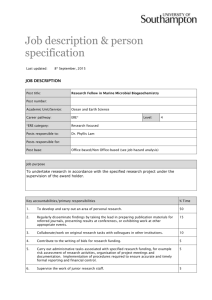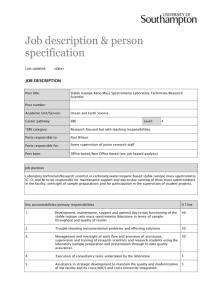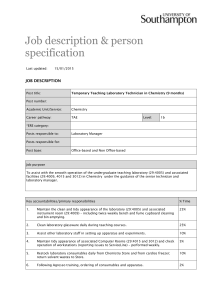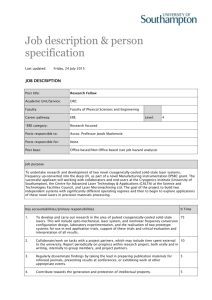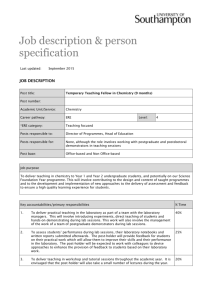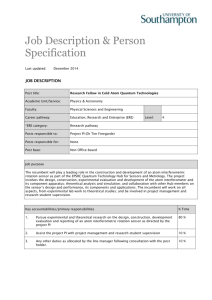Job Description and Person Specification
advertisement
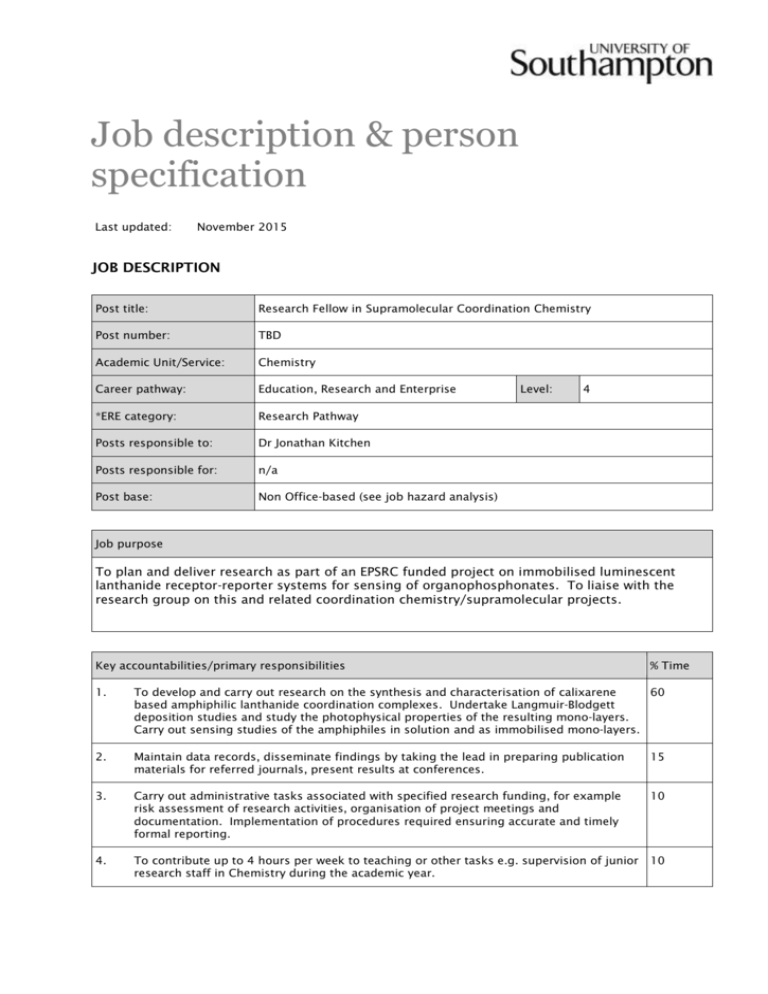
Job description & person specification Last updated: November 2015 JOB DESCRIPTION Post title: Research Fellow in Supramolecular Coordination Chemistry Post number: TBD Academic Unit/Service: Chemistry Career pathway: Education, Research and Enterprise *ERE category: Research Pathway Posts responsible to: Dr Jonathan Kitchen Posts responsible for: n/a Post base: Non Office-based (see job hazard analysis) Level: 4 Job purpose To plan and deliver research as part of an EPSRC funded project on immobilised luminescent lanthanide receptor-reporter systems for sensing of organophosphonates. To liaise with the research group on this and related coordination chemistry/supramolecular projects. Key accountabilities/primary responsibilities % Time 1. To develop and carry out research on the synthesis and characterisation of calixarene 60 based amphiphilic lanthanide coordination complexes. Undertake Langmuir-Blodgett deposition studies and study the photophysical properties of the resulting mono-layers. Carry out sensing studies of the amphiphiles in solution and as immobilised mono-layers. 2. Maintain data records, disseminate findings by taking the lead in preparing publication materials for referred journals, present results at conferences. 15 3. Carry out administrative tasks associated with specified research funding, for example risk assessment of research activities, organisation of project meetings and documentation. Implementation of procedures required ensuring accurate and timely formal reporting. 10 4. To contribute up to 4 hours per week to teaching or other tasks e.g. supervision of junior research staff in Chemistry during the academic year. 10 Key accountabilities/primary responsibilities % Time 5. 5 Any other duties as allocated by the line manager following consultation with the post holder. Internal and external relationships (including nature and purpose of relationships) Internal: As a member of the JAK group, the appointee will be expected to collaborate with current group members and contribute to group meetings and other discussions with research students and with Dr J Kitchen regarding delivery of objectives and project planning/management PERSON SPECIFICATION Criteria Essential Qualifications, knowledge & experience PhD in coordination chemistry or synthetic inorganic chemistry, either awarded or pending. Desirable How to be assessed CV Detailed understanding and knowledge of coordination chemistry and characterisation of coordination complexes CV, references, interview Experience of molecular characterisation using NMR, Mass Spectrometry and X-ray crystallography CV, references, interview Planning & organising Excellent organisational skills with the ability to meet strict deadlines and to work effectively under pressure, both as an individual and within a team. CV, references, interview Problem solving & initiative Able to develop understanding of complex problems and apply indepth knowledge to address them CV, references, interview Able to develop original techniques/methods Management & teamwork Able to supervise work of junior research staff, delegating effectively References, interview Able to contribute to Academic Unit management and administrative processes Document1 2 Work effectively in a team, understanding the strengths and weaknesses of others to help teamwork development Communicating & influencing Communicate new and complex information effectively, both verbally and in writing CV, references, interview Able to present research results at group meetings and conferences Able to write up research results for publication in leading peer-viewed journals Other skills & behaviours Understanding of relevant Health & Safety issues References, Interview Positive attitude to colleagues and students Special requirements Able to attend national and international conferences to present research results Interview Applications will be considered from candidates who are working towards or nearing completion of a relevant PhD qualification. The title of Research Fellow will be applied upon completion of PhD. Prior to the qualification being awarded the title of Senior Research Assistant will be given Document1 3 JOB HAZARD ANALYSIS OFFICE-BASED POST If this post is an office-based job with routine office hazards (eg: use of VDU) no further information needs to be supplied. NON-OFFICE BASED POST If this post has some hazards other than routine office (eg: more than use of VDU) please complete the analysis below. ## - HR will send a full PEHQ to all applicants for this position. ENVIRONMENTAL EXPOSURES Occasionally Frequently Constantly (<30% of time) (30-60% of time) (> 60% of time) Outside work Extremes of temperature (eg: fridge/ furnace) ## Potential for exposure to body fluids ## Noise (greater than 80 dba - 8 hrs twa) ## Exposure to hazardous substances (eg: solvents, liquids, dust, fumes, biohazards). Specify below: X Frequent hand washing Ionising radiation X X EQUIPMENT/TOOLS/MACHINES USED ## Food handling ## Driving university vehicles(eg: car/van/LGV/PCV) ## Use of latex gloves (prohibited unless specific clinical necessity) ## Vibrating tools (eg: strimmers, hammer drill, lawnmowers) PHYSICAL ABILITIES Load manual handling Repetitive crouching/kneeling/stooping Repetitive pulling/pushing Repetitive lifting Standing for prolonged periods X Repetitive climbing (ie: steps, stools, ladders, stairs) Fine motor grips (eg: pipetting) X Gross motor grips X Repetitive reaching below shoulder height X Repetitive reaching at shoulder height Repetitive reaching above shoulder height X X PSYCHOSOCIAL ISSUES Face to face contact with public X Lone working ## Shift work/night work/on call duties Document1 4
